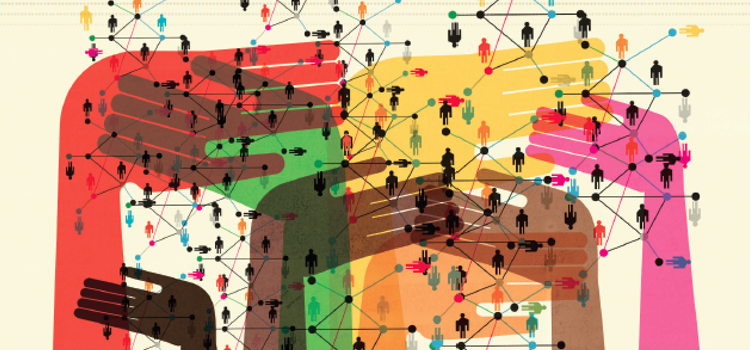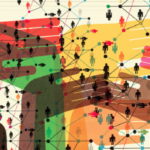There’s a lot of chatter post-election about the 81% of Evangelicals who helped put Trump into office, and rightly so. This election pulled back a 50-year old band-aid and revealed some of the deepest prejudices and injustices of our nation. We found out the depth and tenacity of division in our country.
We’ve seen the meaning of the word Evangelical shift, leaving many of us wondering what it will do to our witness. It will take the church years to recover from this election. Maybe you’re left wondering what to do if you’re part of the 19% who voted and didn’t favor Trump.
The world offers a lot of knowledge about diversity and difference. It falls short, however, in offering motive for sustainable change. But in Jesus, we see someone who also entered into a politically tense climate and transformed the system. As followers of Christ, this is your opportunity to do the same.
This is not the time for placating statements of unity in Christ. More than ever, this is a time for us to acknowledge how we can use our ethnic identities to renew the church. In Jesus, Christianity offers a model of allyship, especially for those in the dominant culture, as a way forward.
I want to offer a four observations on how to be Jesus-like allies. The election pulled back a 50-year old band-aid to reveal prejudice and injustice. Click To Tweet
Jesus Lamented
In Matthew 23 we see Jesus lament over the current state of Jerusalem.
“O Jerusalem, Jerusalem, the city that kills the prophets and stones God’s messengers! How often I have wanted to gather your children together as a hen protects her chicks beneath her wings, but you wouldn’t let me. And now, look, your house is abandoned and desolate.”¹
Like Jesus, it’s appropriate for us to lament over current the state of the white evangelical church. This election unveiled the conflations of faith and ethnicity. A challenge of the white evangelical church is that is has failed to recognize how its cultural identity has influenced its faith and theology. We must confess and repent from the idolatry of nationalism.
Furthermore, we cannot move past our own personal identity transformation and skip ahead to the greater work of reconciling others.
This is where the first steps of reconciliation and allyship begin.
This means acknowledging that many facets of our life—our gender, ethnicity, socioeconomic status, education etc—all work to inform our view of kingdom work. When we talk about transforming the church, we must start with the work of transforming ourselves (after all, we make up the church!). We must model the corporate and systemic transformation we seek in our own lives.
Are we willing to ask the Holy Spirit to teach us to grieve in a way that challenges our own identity? Are we willing to lament over the ways our own place and position (globally and nationally) have contributed to the brokenness revealed in this election? Are we willing to learn and listen to another perspective of history?
A caution: don’t let your lament turn into guilt. When lament turns into white guilt, it loses its transformative power. Guilt becomes a limiting force that centers the weight of sin back on oneself, forgetting how it may have affected another. Lament, however, becomes a motivator to empathize and move toward others. When lament turns into white guilt, it loses its transformative power. Click To Tweet
Jesus Used His Position to Challenge the System
Jesus models allyship by leveraging his ethnic identity to challenge the system. He chose an identity that was like that of God’s people. He used his embodied presence as an entry point to speak to the Jews about expanding the family of God. His position within the people of God allowed him to work in a different way to show them what it meant to include and expand the Kingdom.
In God’s Kingdom, every part of our identity has a purpose. This is the time for the rest of the white-faith-abiding-people to show up. It’s a time, as POC would say, to “take care of your own.” It’s time for white Christians to push back on the image of Evangelicalism.
The Kingdom is transformative. Use your race, gender and class to influence. Jesus modeled pushing back and reforming systems that oppress.
The Book of Common Prayer puts it this way:
“Peacemaking doesn’t mean passivity. It is the act of interrupting injustice without mirroring injustice, the act of disarming evil without destroying the evil doer, the act of finding a third way that is neither fight or flight but the careful arduous pursuit of reconciliation and justice. It’s about a revolution of love that is big enough to set both the oppressed and the oppressor free.”²
Jesus Used His Likeness to Give Away Power
Philippians 2 has one of the best summations of Jesus’ allyship:
“Have this attitude in yourselves which was also in Christ Jesus, who, although He existed in the form of God, did not regard equality with God a thing to be grasped, but emptied Himself, taking the form of a bond-servant, and being made in the likeness of men. Being found in appearance as a man, He humbled Himself by becoming obedient to the point of death, even death on a cross.”³
This is a wonderful model for those asking “what’s next?”. Maybe you’re reading this and you’ve found your voice. You’ve had the conversations, written the articles, read the books. Maybe you’ve identified as a white ally for a while. The tandem we see in the way of Jesus and the key distinction of faith-led allyship is how to use our position AND how to give power away.
How are you changing the structures where you live and work to make space for those who aren’t there? How are you identifying leadership? Are you making accessible paths of leadership for those in the margins? Are you creating space for the voices in your church who are less heard? Are you reading from traditions, voices, and backgrounds that differ from your own? Challenging the system more often looks like identifying how we are part of that system and then working to give our power away.
Often this is where I see the rubber meeting the road for allyship (and the transformational gift the church offers): embracing humility. Jesus doesn’t shy away from the fact that losing power is painful. Are you willing let go of power? Are you ready to face opposition?
Jesus’ allyship and obedience led Him to the cross.
Are you ready for fewer books to be sold? Less attendance at your church or conference? A smaller SEO or hits on your blog? A challenging conversation with your boss? Or more significantly for it to affect relationships or family? Jesus’ allyship and obedience led Him to the cross. Click To Tweet
Join God’s New Thing
It’s easy to think since I’ve written this into a list you can readily move through it. (No, I just did that so it was easier to read). The best tip I can offer you is to view this as a continual cycle. Allyship and identity journeying is hard, long, and constant.
When you find yourself in moments of recognizing hurt and injustice: weep. When you find opportunity to give power away: do it. Sometimes this will happen all at once. Sometimes it doesn’t. Don’t rush it. Allyship shows up more like weeping and less like victory.
View this as an invitation to look further. I believe that God is doing a new thing. This election has felt like a shift– spiritually, socially and globally. Jesus’ model is sustainable because it transforms both the individual and the system. It is not diversity for diversity’s sake but as a renewal of the Kingdom. Ask how your ethnic identity and position allow you to participate in what God is doing. Push past the point of understanding to where it feels uncomfortable.
But first, take the time to lament.
1- Matthew 23:37, NLT
2- Claiborne, S. (2016). The Irresistible Revolution, Updated and Expanded: Living as an Ordinary Radical. Zondervan.
3- Philippians 2:5-7










Missio Alliance Comment Policy
The Missio Alliance Writing Collectives exist as a ministry of writing to resource theological practitioners for mission. From our Leading Voices to our regular Writing Team and those invited to publish with us as Community Voices, we are creating a space for thoughtful engagement of critical issues and questions facing the North American Church in God’s mission. This sort of thoughtful engagement is something that we seek to engender not only in our publishing, but in conversations that unfold as a result in the comment section of our articles.
Unfortunately, because of the relational distance introduced by online communication, “thoughtful engagement” and “comment sections” seldom go hand in hand. At the same time, censorship of comments by those who disagree with points made by authors, whose anger or limited perspective taints their words, or who simply feel the need to express their own opinion on a topic without any meaningful engagement with the article or comment in question can mask an important window into the true state of Christian discourse. As such, Missio Alliance sets forth the following suggestions for those who wish to engage in conversation around our writing:
1. Seek to understand the author’s intent.
If you disagree with something the an author said, consider framing your response as, “I hear you as saying _________. Am I understanding you correctly? If so, here’s why I disagree. _____________.
2. Seek to make your own voice heard.
We deeply desire and value the voice and perspective of our readers. However you may react to an article we publish or a fellow commenter, we encourage you to set forth that reaction is the most constructive way possible. Use your voice and perspective to move conversation forward rather than shut it down.
3. Share your story.
One of our favorite tenants is that “an enemy is someone whose story we haven’t heard.” Very often disagreements and rants are the result of people talking past rather than to one another. Everyone’s perspective is intimately bound up with their own stories – their contexts and experiences. We encourage you to couch your comments in whatever aspect of your own story might help others understand where you are coming from.
In view of those suggestions for shaping conversation on our site and in an effort to curate a hospitable space of open conversation, Missio Alliance may delete comments and/or ban users who show no regard for constructive engagement, especially those whose comments are easily construed as trolling, threatening, or abusive.